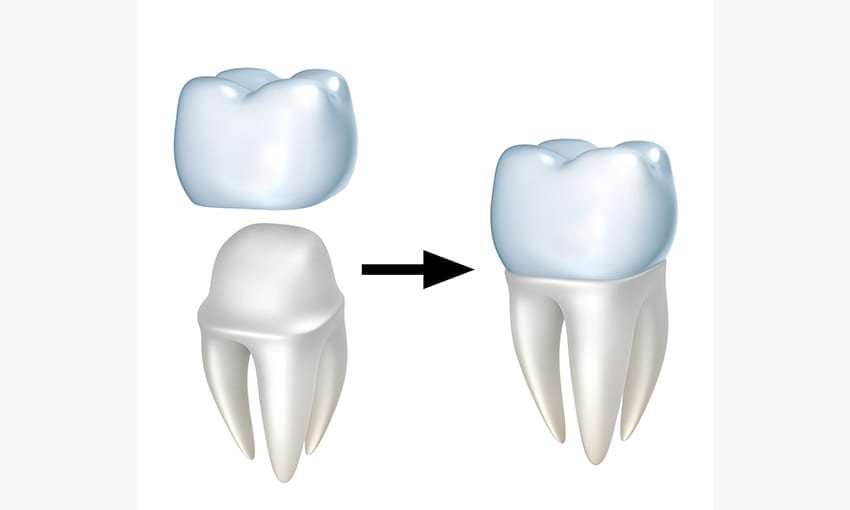Welcome to our blog post on dental crowns in Phoenix! If you’re reading this, chances are you may be considering a dental crown procedure or simply curious about what it entails. Either way, you’ve come to the right place. In this article, we’ll walk you through everything you need to know about dental crowns – from understanding their purpose and types to preparing for the procedure and maintaining your new smile afterwards. So sit back, relax, and let us guide you on your journey towards a successful dental crown experience!
What is a Dental Crown and Why You May Need One
A dental crown is a custom-made cap that fits over a damaged or decayed tooth, restoring its strength, function, and appearance. It acts as a protective covering that encases the entire visible portion of the tooth above the gum line.
There are several reasons why you may need a dental crown. If you have a severely decayed tooth that cannot be restored with a filling alone, a crown can provide the necessary reinforcement to save your natural tooth. Additionally, crowns are commonly used to protect teeth after root canal treatment or to anchor dental bridges in place.
Furthermore, if you have chipped or cracked teeth due to trauma or wear and tear over time, dental crowns can restore their shape and durability. They can also cover discolored or misshapen teeth for an enhanced aesthetic appearance.
By opting for a dental crown procedure when needed, you can not only improve the functionality of your teeth but also enhance your smile confidence. Remember, prevention is key so addressing any underlying oral health issues promptly will help prevent further damage down the road.
The Different Types of Dental Crowns
When it comes to dental crowns, there isn’t a one-size-fits-all solution. Your dentist will recommend the best type of crown based on your specific needs and preferences. Here are some of the different types of dental crowns that you may come across:
1. Porcelain Crowns: These crowns are known for their natural appearance and can be matched to the color of your existing teeth. They are often used for front teeth restoration.
2. Metal Crowns: Made from alloys like gold or silver, metal crowns offer excellent durability and strength. Although they aren’t as aesthetically pleasing as porcelain crowns, they are ideal for restoring molars where aesthetics may not be a priority.
3. Ceramic Crowns: These crowns combine the strength of metal with the natural look of porcelain, making them an excellent choice for both front and back teeth restorations.
How to Prepare for a Dental Crown Procedure
Preparing for a dental crown procedure is essential to ensure a successful outcome and minimize any discomfort or complications. Here are some important steps you can take to prepare yourself:
1. Schedule an initial consultation: The first step in preparing for a dental crown procedure is to schedule a consultation with your dentist. During this visit, your dentist will examine your teeth and determine if a crown is necessary. They may also take X-rays or impressions of your teeth to create the custom crown.
2. Discuss treatment options: Once it’s confirmed that you need a dental crown, discuss with your dentist the different types of crowns available and which one would be most suitable for you. Factors such as durability, aesthetics, and cost should be considered.
3. Arrange transportation: Since the procedure may involve anesthesia or sedation, it’s advisable to arrange transportation to and from the dental office on the day of the appointment.
4. Follow pre-procedure instructions: Your dentist will provide specific instructions before the procedure regarding fasting requirements, medications to avoid, and other preparation guidelines. It’s crucial to follow these instructions carefully for optimal results.
5. Plan time off work: Depending on the complexity of your case, you may need some downtime after getting a dental crown. Consider scheduling time off work or avoiding strenuous activities immediately following the procedure.
6. Practice good oral hygiene: Leading up to your appointment, maintain proper oral hygiene by brushing twice daily with fluoride toothpaste and flossing regularly. This helps prevent any potential infection that could interfere with the healing process.
By taking these steps in preparing for a dental crown procedure, you can ensure that everything goes smoothly during both preparation and recovery phases!
The Procedure: Step by Step Guide
When it comes to getting a dental crown, understanding the procedure can help ease any anxieties you may have. Here is a step-by-step guide of what to expect during the process.
1. Consultation and Examination
Your journey begins with a consultation and examination by your dentist. They will assess your tooth’s condition and determine if a dental crown is necessary.
2. Tooth Preparation
Before placing the crown, your dentist will prepare the tooth by removing any decay or existing filling material. They will shape the tooth to ensure a proper fit for the crown.
3. Impressions
Next, impressions of your teeth are taken using either traditional putty-like material or digital scanning technology. These impressions serve as models for creating your custom-made crown.
4. Temporary Crown Placement
While waiting for your permanent crown to be fabricated in a dental laboratory, a temporary crown is placed over the prepared tooth to protect it.
5. Crown Fabrication
In specialized laboratories equipped with advanced technology, skilled technicians craft your custom dental crown based on the impressions taken earlier.
6. Final Placement
Once ready, you return to see your dentist for final placement of the permanent crown onto your prepared tooth using dental cement or adhesive bonding agents.
By following these steps carefully, dentists ensure that patients receive high-quality crowns that restore both function and aesthetics in their smiles!
Aftercare and Maintenance Tips for Your Dental Crown
Taking care of your dental crown is crucial to ensure its longevity and maintain good oral health. Here are some essential aftercare and maintenance tips:
1. Maintain Proper Oral Hygiene: Brushing twice a day, flossing daily, and using an antibacterial mouthwash can help keep your dental crown clean and free from plaque buildup.
2. Avoid Hard or Sticky Foods: Chewing on hard candies, ice cubes, or sticky foods like caramels can put unnecessary stress on your dental crown. Opt for softer foods that won’t damage or dislodge the restoration.
3. Wear a Nightguard: If you have a habit of teeth grinding or clenching at night (bruxism), wearing a custom-made nightguard can protect both your natural teeth and the dental crown from excessive force.
4. Regular Dental Check-ups: Schedule regular visits with your dentist in Phoenix to monitor the condition of your dental crown. They will assess its fit, check for any signs of wear or damage, and perform professional cleaning if necessary.
5. Be Mindful of Habits: Avoid biting down on non-food objects like pens or opening packages with your teeth as these actions can chip or break the crown.
6. Quit Bad Habits: Smoking not only stains but also weakens the structure of the tooth supporting the dental crown over time. Quitting smoking will benefit both your overall health and oral health.
By following these aftercare tips diligently, you can ensure that your dental crowns in Phoenix stay strong, functional, and aesthetically appealing for many years to come! Remember to consult with your dentist if you experience any discomfort or notice any changes in how your dental crown feels or looks.
Common Misconceptions About Dental Crowns
There are many misconceptions surrounding dental crowns, which can lead to confusion and misinformation. Let’s debunk some of the most common ones:
1. Dental crowns are only for older people: This is not true! Dental crowns can be beneficial for individuals of all ages who have damaged or weakened teeth that need protection and restoration.
2. Getting a dental crown is painful: The procedure itself is virtually painless, as your dentist will use local anesthesia to ensure your comfort during the process. You may experience some sensitivity or discomfort afterward, but this is temporary and can be managed with over-the-counter pain relievers.
3. Dental crowns look fake: With advancements in technology and materials, dental crowns now mimic the appearance of natural teeth more effectively than ever before. Your dentist will match the color, shape, and size of your crown to blend seamlessly with your existing teeth.
4. Crowns require special care: While it’s important to maintain good oral hygiene habits like regular brushing and flossing, caring for a dental crown isn’t much different from caring for your natural teeth. Just remember to avoid biting down on hard objects or using your teeth as tools.
5. All dental crowns are made from metal: While metal-based crowns were commonly used in the past due to their durability, there are now various types available including porcelain-fused-to-metal (PFM) and all-ceramic options that provide excellent aesthetic results without compromising strength.
6. Dental insurance doesn’t cover crown procedures: Many dental insurance plans do cover a portion of the cost for necessary restorative treatments like dental crowns. It’s always best to check with your provider beforehand so you’re aware of any potential out-of-pocket expenses.
Conclusion
In this article, we have explored the world of dental crowns and learned about their importance in maintaining oral health. Whether you need a dental crown to restore a damaged tooth or enhance your smile, it is essential to be well-informed about the procedure.
By following these tips for a successful dental crown procedure, you can ensure that your experience is smooth and comfortable. Remember to consult with your dentist about the different types of crowns available and discuss which option would best suit your needs.
Preparing for the procedure involves proper oral hygiene practices and discussing any concerns or questions with your dentist beforehand. During the actual procedure, trust in the expertise of your dental professional as they guide you through each step.
Aftercare is crucial for maintaining the longevity of your dental crown. By practicing good oral hygiene habits, avoiding hard foods, and scheduling regular check-ups with your dentist, you can keep your crown looking great for years to come.
It’s important to address common misconceptions about dental crowns so that patients are well-informed. Dental crowns are not painful procedures; on the contrary, they alleviate pain by restoring teeth functionality. Additionally, while some may worry about their appearance being affected by a crown placement—modern technology ensures that crowns blend seamlessly with natural teeth.
So if you’re considering getting a dental crown in Phoenix or anywhere else—don’t hesitate! Trust in these helpful tips and leave feeling confident in both yourself and your smile!
Remember: Your oral health matters! Take care of those pearly whites!









